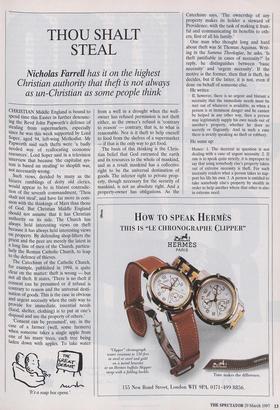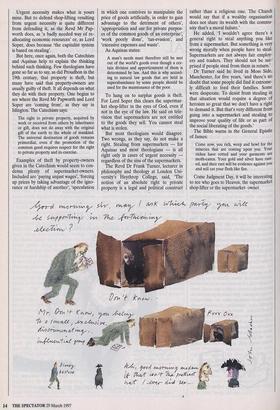THOU SHALT STEAL
Nicholas Farrell has it on the highest
Christian authority that theft is not always as un-Christian as some people think
CHRISTIAN Middle England is bound to Spend time this Easter in further denounc- ing the Revd John Papworth's defence of stealing from supermarkets, especially since he was this week supported by Lord Soper, aged 94, left-wing Methodist. Mr Papworth said such thefts were 'a badly needed way of reallocating economic resources'. Lord Soper said in a television interview that because 'the capitalist sys- tem is based on stealing' to shoplift was, not necessarily wrong. Such views, derided by many as the bizarre ramblings of dotty old clerics, would appear to be in blatant contradic- tion of the seventh commandment, 'Thou shalt not steal', and have far more in com- mon with the thinkings of Marx than those of God. But Christian Middle England Should not assume that it has Christian authority on its side. The Church has always held interesting views on theft because it has always held interesting views on property. By defending shop-lifters the Priest and the peer are merely the latest in a long line of men of the Church, particu- larly the Roman Catholic Church, to leap to the defence of thieves.
The Catechism of the Catholic Church, for example, published in 1994, is quite clear on the matter: theft is wrong — but not all theft. It states, 'There is no theft if consent can be presumed or if refusal is contrary to reason and the universal desti- nation of goods. This is the case in obvious and urgent necessity when the only way to provide for immediate, essential needs (food, shelter, clothing) is to put at one's disposal and use the property of others.' 'Consent can be presumed', say, in the Case of a farmer (well, some farmers) When someone takes a single apple from one of his many trees, each tree being laden down with apples. To take water from a well in a drought when the well- owner has refused permission is not theft either, as the owner's refusal is 'contrary to reason' — contrary, that is, to what is reasonable. Nor is it theft to help oneself to food from the shelves of a supermarket — if that is the only way to get food.
The basis of this thinking is the Chris- tian belief that God entrusted the earth and its resources to the whole of mankind, and as a result mankind has a collective right to be the universal destination of goods. The inferior right to private prop- erty, though necessary for the security of mankind, is not an absolute right. And a property-owner has obligations. As the Catechism says, 'The ownership of any property makes its holder a steward of Providence, with the task of making it fruit- ful and communicating its benefits to oth- ers, first of all his family.'
One man who thought long and hard about theft was St Thomas Aquinas. Writ- ing in the Summa Theologiae, he asks, 'Is theft justifiable in cases of necessity?' In reply, he distinguishes between 'basic necessity' and 'urgent necessity'. If the motive is the former, then that is theft, he decides, but if the latter, it is not, even if done on behalf of someone else.
He writes:
If, however, there is so urgent and blatant a necessity that the immediate needs must be met out of whatever is available, as when a person is in imminent danger and he cannot be helped in any other way, then a person may legitimately supply his own needs out of another's property, whether he does so secretly or flagrantly. And in such a case there is strictly speaking no theft or robbery.
He sums up:
Hence: 1. The decretal in question is not dealing with a case of urgent necessity. 2. If one is to speak quite strictly, it is improper to say that using somebody else's property taken out of extreme necessity is theft. For such necessity renders what a person takes to sup- port his life his own. 3. A person is entitled to take somebody else's property by stealth in order to help another where that other is also in extreme need.
Urgent necessity makes what is yours mine. But to defend shop-lifting resulting from urgent necessity is quite different from defending it, as the Revd Mr Pap- worth does, as 'a badly needed way of re- allocating economic resources' or, as Lord Soper, does because 'the capitalist system is based on stealing'.
But here, once again, both the Catechism and Aquinas help to explain the thinking behind such thinking. Few theologians have gone so far as to say, as did Proudhon in the 19th century, that property is theft, but many have said that property-owners are usually guilty of theft. It all depends on what they do with their property. One begins to see where the Revd Mr Papworth and Lord Soper are 'coming from', as they say in Islington. The Catechism says:
The right to private property, acquired by work or received from others by inheritance or gift, does not do away with the original gift of the earth to the whole of mankind. The universal destination of goods remains primordial, even if the promotion of the common good requires respect for the right to private property and its exercise.
Examples of theft by property-owners given in the Catechism would seem to con- demn plenty of supermarket-owners. Included are 'paying unjust wages', 'forcing up prices by taking advantage of the igno- rance or hardship of another', 'speculation in which one contrives to manipulate the price of goods artificially, in order to gain advantage to the detriment of others', 'appropriation and use for private purpos- es of the common goods of an enterprise', 'work poorly done', 'tax-evasion', and 'excessive expenses and waste'.
As Aquinas states:
A man's needs must therefore still be met out of the world's goods even though a cer- tain division and apportionment of them is determined by law. And this is why accord- ing to natural law goods that are held in superabundance by some people should be used for the maintenance of the poor.
To hang on to surplus goods is theft. For Lord Soper this clears the supermar- ket shop-lifter in the eyes of God, even if not in the eye of the law. He said on tele- vision that supermarkets are not entitled to the goods they sell. You cannot steal what is stolen.
But most theologians would disagree. Two wrongs, as they say, do not make a right. Stealing from supermarkets — for Aquinas and most theologians — is all right only in cases of urgent necessity — regardless of the sins of the supermarkets.
The Revd Dr Frank Turner, lecturer in philosophy and theology at London Uni- versity's Heythrop College, said, 'The notion of an absolute right to private property is a legal and political construct rather than a religious one. The Church would say that if a wealthy organisation does not share its wealth with the commu- nity that's a moral failure.' He added, 'I wouldn't agree there's a general right to steal anything you like from a supermarket. But something is very wrong morally when people have to steal. Supermarkets are not always fair employ- ers and traders. They should not be sur prised if people steal from them in return.'
Dr Turner said he lived in Moss Side, Manchester, for five years, 'and there's no doubt that some people did find it extreme- ly difficult to feed their families. Some were desperate. To desist from stealing in that situation would require a degree of heroism so great that we don't have a right to demand it. But that's very different from going into a supermarket and stealing to improve your quality of life or as part of the social liberating of the goods.'
The Bible warns in the General Epistle of James: Come now, you rich, weep and howl for the miseries that are coming upon you. Your riches have rotted and your garments are moth-eaten. Your gold and silver have rust- ed, and their rust will be evidence against you and will eat your flesh like fire.
Come Judgment Day, it will be interesting to see who goes to Heaven, the supermarket shop-lifter or the supermarket- owner.



































































 Previous page
Previous page